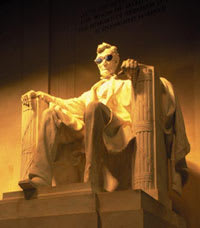
Legislation�Like Charlie and the MTA By Steph De Long It's probably just as well Abe can't see what's going on in Washington these days. And if he'd ever heard of the Kingston Trio's song "The Man Who Never Returned," in which Charlie is forever stuck riding the rails of Boston's MTA, he'd probably agree that a similar tune could be sung about the current state of some legislation. Especially, low vision legislation. Charlie was doomed to life on a criss-cross of tracks, while today's legislation seems equally stuck in what one insider calls "a labyrinth of Congressional Committees." H.R. 2870, also known as "The Medicare Vision Rehabilitation Act of 1999," was introduced into the House last September by Congressman Michael Capuano of Massachusetts. The proposed legislation would provide Medicare reimbursement for the vision rehabilitation services of rehab teachers, orientation and mobility specialists, and low vision therapists.
Alison Mills, press secretary to Capuano, admits the bill's chance of passage "is slim for what little remains in this year. It is, however, still in two committees-in Commerce and Ways and Means. We're encouraged at the bipartisan support the bill has received, and we'll be refiling in January." Proponents, now numbering 119 co-sponsors from both Houses as well as the 17 private agencies that are members of the National Vision Rehabilitation Cooperative, argue that similar training for stroke victims and even those suffering from hip fractures is covered and that H.R. 2870 would put vision rehab on a par with other such restorative therapies. Non-supporters, including some ophthalmologists, disagree and argue that the vision care personnel requesting coverage do not, in fact, represent true professions with licensing or credentialing. Passing such legislation, they argue, would be creating professions that currently don't exist.
Under the umbrella of the National Vision Rehabilitation Cooperative, however, there is very strong support from a number of private, powerhouse agencies, including Lighthouse International and American Federation for the Blind. Whether it's reimbursement or licensing, what can you do to further the causes that you support in this arena? The best first step is to contact your own congressional representatives. And, thanks to the National Vision Rehabilitation Cooperative's Website, it couldn't be easier. Just log onto www.medicarenow.org/ and find not only names and addresses of all representatives, but sample letters that can be submitted online through the group's address. As one Washington observer put it when I told him this was sounding a bit like Charlie and the MTA, "Well, this time the train really is leaving the station. It's going to stop, but we're not sure where." EB
|
Article
Focus on Low Vision
Legislation…Like Charlie and the MTA
Eyecare Business
November 1, 2000



